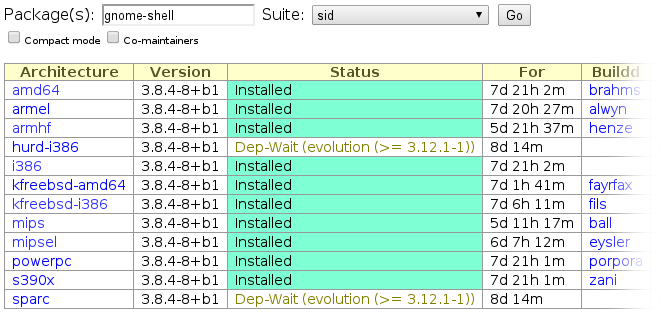
Last week was the
OpenStack Design Summit
in Atlanta, GA where we, developers, discussed and designed the new
OpenStack release (Juno) coming up. I've been there mainly to discuss
Ceilometer upcoming developments.

The summit has been great. It was my third OpenStack design summit, and the
first one not being a PTL, meaning it was a largely more relaxed summit for
me!
On Monday, we started by a 2.5 hours meeting with Ceilometer core developers
and contributors about the Gnocchi experimental project that I've started a
few weeks ago. It was a great and productive afternoon, and allowed me to
introduce and cover this topic extensively, something that would not have
been possible in the allocated session we had later in the week.
Ceilometer had his design sessions running mainly during Wednesday. We noted
a lot of things and commented during the sessions in our
Etherpads instances.
Here is a short summary of the sessions I've attended.
Scaling the central agent
I was in charge of the first session, and introduced the work that was done
so far in the scaling of the central agent. Six months ago, during the
Havana summit, I proposed to scale the central agent by distributing the
tasks among several node, using a library to handle the group membership
aspect of it. That led to the creation of the
tooz library that we worked on at
eNovance during the last 6 months.
Now that we have this foundation available, Cyril Roelandt started to
replace the Ceilometer alarming job repartition code by Taskflow and Tooz.
Starting with the central agent is simpler and will be a first proof of
concept to be used by the central agent then. We plan to get this merged for
Juno.
For the central agent, the same work needs to be done, but since it's a bit
more complicated, it will be done after the alarming evaluators are
converted.
Test strategy
The next session discussed the test strategy and how we could improve
Ceilometer unit and functional testing. There is a lot in this area to be
done, and this is going to be one of the main focus of the team in the
upcoming weeks. Having Tempest tests run was a goal for Havana, and even if
we made a lot of progress, we're still no there yet.
Complex queries and per-user/project data collection
This session, led by Ildik V ncsa, was about adding finer-grained
configuration into the pipeline configuration to allow per-user and
per-project data retrieval. This was not really controversial, though how to
implement this exactly is still to be discussed, but the idea was well
received. The other part of the session was about adding more in the complex
queries feature provided by the v2 API.
Rethinking Ceilometer as a Time-Series-as-a-Service
This was my main session, the reason we met on Monday for a few hours, and
one of the most promising session I hope of the week.
It appears that the way Ceilometer designed its API and storage backends a
long time ago is now a problem to scale the data storage. Also, the events
API we introduced in the last release partially overlaps some of the
functionality provided by the samples API that causes us scaling troubles.
Therefore, I've started to rethink the Ceilometer API by building it as a
time series read/write service, letting the audit part of our previous
sample API to the event subsystem. After a few researches and experiments,
I've designed a new project called
Gnocchi, which provides exactly that
functionality in a hopefully scalable way.
Gnocchi is split in two parts: a time series API and its driver, and a
resource indexing API with its own driver. Having two distinct driver sets
allows it to use different technologies to store each data type in the best
storage engine possible. The canonical driver for time series handling is
based on
Pandas and
Swift. The canonical resource indexer driver
is based on
SQLAlchemy.
The idea and project was well received and looked pretty exciting to most
people. Our hope is to design a version 3 of the Ceilometer API around
Gnocchi at some point during the Juno cycle, and have it ready as some sort
of preview for the final release.
Revisiting the Ceilometer data model
This session led by Alexei Kornienko, kind of echoed the previous session,
as it clearly also tried to address the Ceilometer scalability issue, but in
a different way.
Anyway, the SQL driver limitations have been discussed and Mehdi Abaakouk
implemented some of the suggestions during the week, so we should very soon
see more performances in Ceilometer with the current default storage driver.
Ceilometer devops session
We organized this session to get feedbacks from the devops community about
deploying Ceilometer. It was very interesting, and the list of things we
could improve is long, and I think will help us to drive our future efforts.
SNMP inspectors
This session, led by Lianhao Lu, discussed various details of the future of
SNMP support in Ceilometer.
Alarm and logs improvements
This mixed session, led by Nejc Saje and Gordon Chung, was about possible
improvements on the alarm evaluation system provided by Ceilometer, and
making logging in Ceilometer more effective. Both half-sessions were
interesting and led to several ideas on how to improve both systems.
Conclusion
Considering the current QA problems with Ceilometer, Eoghan Glynn, the new
Project Technical Leader for Ceilometer, clearly indicated that this will
be the main focus of the release cycle.
Personally, I will be focused on working on Gnocchi, and will likely be
joined by others in the next weeks. Our idea is to develop a complete
solution with a high velocity in the next weeks, and then works on its
integration with Ceilometer itself.
 Well, here are the stats for week 6 of the DUCK challenge:
Well, here are the stats for week 6 of the DUCK challenge:
 What happened in the
What happened in the  Yesterday, my first term started as the
Yesterday, my first term started as the  This year's DPL campaign is over and voting period is also almost over. Many did not vote yet and they really should consider doing so. This is meant as a reminder for them. If you didn't have time to dig into
This year's DPL campaign is over and voting period is also almost over. Many did not vote yet and they really should consider doing so. This is meant as a reminder for them. If you didn't have time to dig into  Last week was the
Last week was the
 The summit has been great. It was my third OpenStack design summit, and the
first one not being a PTL, meaning it was a largely more relaxed summit for
me!
On Monday, we started by a 2.5 hours meeting with Ceilometer core developers
and contributors about the Gnocchi experimental project that I've started a
few weeks ago. It was a great and productive afternoon, and allowed me to
introduce and cover this topic extensively, something that would not have
been possible in the allocated session we had later in the week.
Ceilometer had his design sessions running mainly during Wednesday. We noted
a lot of things and commented during the sessions in our
The summit has been great. It was my third OpenStack design summit, and the
first one not being a PTL, meaning it was a largely more relaxed summit for
me!
On Monday, we started by a 2.5 hours meeting with Ceilometer core developers
and contributors about the Gnocchi experimental project that I've started a
few weeks ago. It was a great and productive afternoon, and allowed me to
introduce and cover this topic extensively, something that would not have
been possible in the allocated session we had later in the week.
Ceilometer had his design sessions running mainly during Wednesday. We noted
a lot of things and commented during the sessions in our
 There is a strange bug in Planet Debian I am seeing since
I joined. It is rather minor, but since it is an accessibility
bug, I'd like to mention it here. I have written to
the Planet Debian maintainers, and was told to figure it out myself.
This is a pattern, accessibility is considered wishlist, apparently.
And the affected people are supposed to fix it on their own.
It is better if I don't say anything more about that attitude.
There is a strange bug in Planet Debian I am seeing since
I joined. It is rather minor, but since it is an accessibility
bug, I'd like to mention it here. I have written to
the Planet Debian maintainers, and was told to figure it out myself.
This is a pattern, accessibility is considered wishlist, apparently.
And the affected people are supposed to fix it on their own.
It is better if I don't say anything more about that attitude.

 OpenStack upstream was released today. Thanks to the release team and a big up to TTX for his work.
By the time you read this, probably all of my uploads have reached your local Debian mirror.
Please try Havana using either Sid from any Debian mirror, or using the Wheezy backports available here:
deb http://havana.pkgs.enovance.com/debian havana main
OpenStack upstream was released today. Thanks to the release team and a big up to TTX for his work.
By the time you read this, probably all of my uploads have reached your local Debian mirror.
Please try Havana using either Sid from any Debian mirror, or using the Wheezy backports available here:
deb http://havana.pkgs.enovance.com/debian havana main



 I totally forgot it, but as the DPL elections are now done, we
have a winner for the
I totally forgot it, but as the DPL elections are now done, we
have a winner for the 
 This is my monthly summary of my free software related activities. If you re among the people who
This is my monthly summary of my free software related activities. If you re among the people who  ). If I had to single the talk that intrigued me the
most, I'd name Joss' talk on
). If I had to single the talk that intrigued me the
most, I'd name Joss' talk on